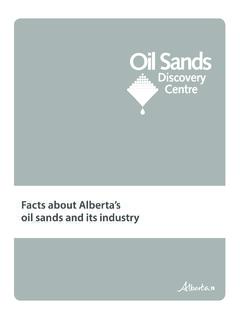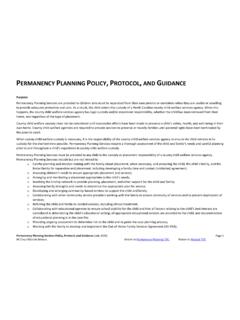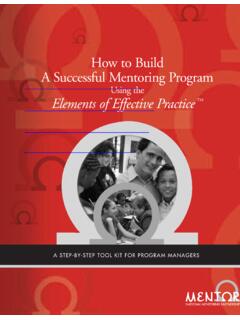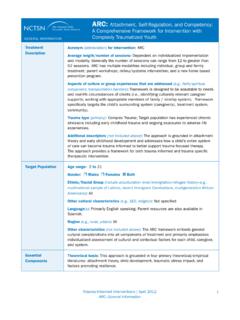Transcription of Compensation Guide for Foster and Kinship Caregivers - …
1 2017 [ Compensation Guide ] For Foster and Kinship Caregivers 1 Contents Introduction .. 3 Equipment and Furnishings .. 3 Foster Caregivers .. 3 Kinship Caregivers .. 3 Kinship Care Support Plan Initial Costs .. 3 Cost Sharing .. 4 General Guidelines for Compensation .. 4 Daily Maintenance Payments to Caregivers .. 5 Basic Maintenance .. 5 Skill Fees Foster Caregivers Only .. 6 Respite Per Diem Foster and Kinship Caregivers .. 6 Automatic Relief/Respite .. 8 Special Rates Foster Caregivers 8 Infant Care 8 Infant Care Initial Expenses .. 8 Infant Care Costs .. 9 Transportation .. 9 Vehicle Additional Compensation ..10 Absences ..10 Approved Absences ..10 Absent Without Leave (AWOL) ..11 Entitlements of Children in Care ..11 Recreation Fund ..11 Vacation/Camp Allowance ..11 Education Related Expenses ..11 Graduation ..11 School Trips ..12 Tutors ..12 Alternate Educational Options ..12 Post- Secondary Education ..12 Preschool or Daycare Programming.
2 13 2 Cultural Costs ..13 Driver Training ..13 Christmas Gifts/ Birthday Gifts ..14 Special Costs ..14 Funeral Arrangements ..14 Emergency Situations ..14 Ex-gratia Payments ..14 Medical Costs ..14 Payment for All Medical/Dental/Optical Services Received by a Registered Indian Child ..15 Medications/supplies ..15 Ambulance Services ..15 Prosthesis ..16 Optical ..16 Dental ..17 Orthodontics ..17 Babysitting and Respite ..17 Babysitting ..17 Respite ..18 Training ..18 Kinship Support Plans Ongoing ..18 3 Introduction Children s Services has developed this financial information Guide to provide Caregivers and staff with an overview of financial responsibilities of Child and Family Services (CFS) or Delegated First Nations Agency (DFNA) and caregiver parents have when a child is placed in care. It explains the financial process to access funds for children in care. Equipment and Furnishings Foster Parents Foster homes are responsible for supplying equipment and furnishings appropriate to the requested age of Foster children.
3 This includes: Beds, dressers, car seats, cribs, tether straps, etc. Bedding, towels, toothbrushes, basic hygiene supplies Toys Smoke detectors, carbon monoxide detectors, first aid kits and any required safety equipment and any required changes required by licensing All equipment or furnishings must meet safety and licensing standards as per the Environmental Safety Assessment for Caregivers [FC3606]. For example, a Foster home wishing to care for young children should be equipped with a car seat with tether strap, booster seat, cribs, etc. Any exceptional furniture or equipment needs should be discussed with the child s caseworker. Kinship Caregivers Kinship Caregivers must meet safety standards as per the Environmental Safety Assessment for Caregivers [FC3606]. Kinship Caregivers do not need to meet licensing standards and have their homes ready prior to a child s arrival. Frequently, children placed in Kinship homes are placed without any prior planning and the Kinship families are compensated differently than Foster families.
4 Kinship Care Support Plan Initial Costs Kinship Care Support Plans are mandatory for all Kinship homes. If the home does not have the necessary furnishings or safety equipment required, a Kinship Care Support Plan [FC3899] can accommodate any of the initial startup costs. 4 Typical startup costs that can be covered are, but are not limited to: Cribs, beds, dressers, other furnishings Clothing, beddings, additional towels, basic hygiene needs Food, baby formula, diapers High chair, strollers, car seats Smoke detectors, carbon monoxide detectors, plug-in cover, fire extinguishers, etc. Household repairs, window installation, door repair, etc. The intent of the covering the startup cost is to remove any physical barriers to placement of children in the home. In some cases, managerial approval may be required. Cost Sharing It is the expectation that the child s caseworker will explore cost sharing with parents or legal guardians of the child.
5 The child s caseworker will also explore cost sharing with adolescents in care when it is deemed appropriate. In cases where it is the responsibility of the parents or adolescent to obtain specific items, the child s caseworker will provide the Foster parent with information on how the item will be obtained. Typical areas where cost sharing may be explored are: Clothing (parents/guardians) Recreation (parents/guardians) Self-care products, clothing, etc. (famous name type, or prepping for independent living adolescents) However, when cost sharing, no child or youth should go without necessities while waiting for parents or guardians to come up with clothing or the agreed upon product. General Guidelines for Compensation If a child needs a service that is not outlined in this Guide or the costs are more than the standard please contact your child s caseworker. Their supervisor or manager must approve exceptions. Always keep receipts.
6 If you wish to be compensated for something, get prior approval preferably in writing. Document expenses. 5 In making decisions about the cost, the supervisor and manager will consider the cost and the benefit to the child, other sources of funding and the community standard. Daily Maintenance Payments to Caregivers Basic maintenance ( Foster and Kinship Caregivers ) and skill fees (licensed Foster Caregivers only) are paid to Caregivers each month through direct deposit. Costs associated and covered under a child s Personal Healthcare Number (PHN), Treatment Services Cards or being billed directly to a CFS region or DFNA will be paid to the vendor directly by the responsible party, , Blue Cross, Alberta Health and Wellness. Any child-related cost that a caregiver is expected to pay up front, and be reimbursed for must be claimed by the caregiver using a child maintenance invoice. (There is no provincial form for this invoice, so its appearance may vary.)
7 However, the caregiver must complete the invoice and provide receipts for auditing purposes. The caregiver then submits the invoice and documentation to the child s caseworker for reimbursement. It is therefore necessary that Caregivers complete a separate invoice for each child in their home. This will ensure that payment to the caregiver is not delayed. All requests for reimbursement should be submitted with receipts within the first 10 days of the following month, so reimbursement can be made in a timely fashion. Payment to Caregivers is non-taxable. As it is not considered to be income and is based on child placement, requesting statements from CFS/DFNA offices regarding income to support applications for credit is discouraged. Basic Maintenance The basic maintenance rate is a per diem that covers all of a child s day-to-day costs. Maintenance is paid to Caregivers automatically. When arrangements are made for a new placement, that home may be paid for the days the child has pre-placement visits.
8 In other words, both homes (previous placement and new placement) may be compensated at the same time for the same child. This payment includes the basic maintenance rate plus the appropriate skill fee. This applies to both Foster and Kinship homes. The home doing the pre-placement visit may have to fill in an invoice to receive payment for the visits. If you do not have an actual Treatment Services Card , keep in mind that the Child s ID number (found on the child s Delegation) is the same number as the Treatment Services Number 6 Payments are deposited directly into the caregiver bank account. Caregivers are required to complete the application for direct deposit and vendor information forms. The caregiver will be mailed a statement showing how much they will receive. Items to be purchased by a caregiver using the basic maintenance include: Food, Clothing, Personal care items (toiletries and hair care products), General household costs ( , wear and tear, cleaning, paper supplies, insurance), Spending allowance (minor recreation toys, magazines, records and gifts), Non-prescription medications, and Gifts to the Foster child and gifts from the Foster child to other family members (Note: This very important for children to maintain natural family connections and can be easily forgotton).
9 A caregiver is required to allocate for these items from their basic maintenance on a monthly or weekly basis for the child. A caseworker may talk with a child to ensure that the child is receiving allowances or clothing consistent to others in the home or consistent with community standard. Basic maintenance is paid from the date of when a child is first placed in the caregiver home to the last day the child was in your home. Skill Fees Foster Parents Only Level 1 and level 2 skill fees are an acknowledgement of Foster caregiver skill, training and experience. Skill fees are based on the classification of the Foster home. Foster Caregivers are paid skill fees for each child in the placement and for each day the child is in the placement, including the day of arrival and the day the child departs from the home. A level 2 Foster home receives the level 2 skill fee even if a child placed in the home does not require a level 2 placement.
10 Respite Per Diem Foster and Kinship Caregivers An additional per diem is added to the basic maintenance to both Foster and Kinship Caregivers . Please see Caregiver Rate Schedule [FC1263] for current daily per diem. This funding is intended to enable and encourage Foster Caregivers to take necessary and healthy breaks from the day-to-day demands of caregiving. This amount is not intended to pay 7 for child specific or Foster home specific respite that may be required and would be negotiated as part of a Foster care support plan. Foster families who are compensated by DFNAs have the option of receiving their respite funds either through support plans or special rates. Babysitting Relief Respite Alternate Child Care Reason Short-term (not over-night) Caregiver away for an extended period of time Provided to Caregivers under exceptional circumstances or for children with complex needs Caregivers working out of the home and having child care providers who relate to the child in a parenting capacity Nannies Duration Up to 12 hours and usually in the Caregivers home Overnight, weekend, a week at a time As outlined in a Support or Kinship Care Plan Regular ongoing basis Safety Checks Caregivers choose the babysitter and consider: maturity, skill level experience of the person number and needs of the children The babysitter must be able to reach the caregiver in emergency.












